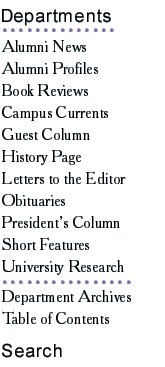

|
 Cover illustration by Byron Gin 
|
Master of Chaos A UNH mathematician has found a way to capitalize on chaos Late one night when he was working in Kingsbury Hall, Kevin Short needed an objective ear or two. He called his parents in New York state and said, "Tell me what this sounds like." Then he held the telephone receiver to his computer speaker. "A harpsichord," was the immediate and emphatic reply. "That's when I knew that this was not just a limited project, but something that could have profound effects," recalls Short. The timbre of a harpsichord is unusually difficult to reproduce, yet he had used a mathematical equation to generate waveforms indistinguishable from harpsichord music. And he needed only a tiny amount of digital information to do it. A physicist and associate professor of applied mathematics, Short has discovered how to apply the mathematics of chaos theory to make electronic communications better, faster, cheaper and more secure. His work has major implications for the networking and telecommunications fields, because the same technology he used to reproduce the notes of a harpsichord can be used to send audio, video or image files over the Internet. Imagine downloading a feature-length film from the Web in a few minutes or storing a thousand hours of music on one compact disc. This technology may make that feasible. Short's invention is called chaotic compression technology (CCT). "This isn't an outgrowth of any existing technology; it's fundamentally different," he says. CCT uses nonlinear mathematical equations to produce complex waveforms that can be used to replace the data in audio and video files. These waveforms can be transmitted through the Internet or any communications device. It requires far less bandwidth than current technology to transmit the same amount of data. Its potential applications look so promising that the university has set up its first spinoff company, Chaoticom, to develop and market them. CCT grew out of Short's study of chaos theory. With its reliance on differential equations and nonlinear math, chaos theory can be difficult to fathom. Mathematicians define chaos as occurrences that fall somewhere between the periodic and the truly random. "Chaotic systems--like the weather--are predictable in the short term, but not in the long term," Short says. Perhaps the most famous illustration of chaos theory is the Butterfly Effect, which shows how a small action can produce enormous effects in the future. Thus a butterfly flaps its wings in China today and, theoretically, causes a major storm in the United States next month. "In our work," explains Short, "we have had to walk a tight line between controlling and reducing large-scale, long-term changes while still allowing the system to produce wildly varying patterns or waveforms." Short began this line of research when he received grants from the National Security Agency to test encryption systems based on chaos theory. He broke every system he tested, but realized that the security flaws could be fixed. He and mathematics graduate student Andy Parker devised a more secure encryption scheme. In the process, Short discovered how to make waveforms suitable for music and then enlisted the help of two undergraduates to develop music-synthesizing software. According to Kimo Johnson, a dual major in math and music, Short "saw a few of us who wanted to put in extra work and found ways of challenging us." Johnson and physics major Dan Hussey got a lot of strange "bleeps and blurps" from their computer, but they ultimately succeeded in synthesizing music. Convinced that this application of chaotic compression technology could have commercial potential, Short turned to a professor in the Whittemore School, Jeff Sohl, to help him market it. Sohl, who is director of the Center for Venture Research, was co-teaching a year-long course in entrepreneurship for the executive M.B.A. program. He saw Short's invention as an opportunity for his students to put business theories into practice. The graduate students leapt at the chance to create a business plan for a promising high-tech startup. "A lot of entrepreneurs come to me with ideas, but by studying the investor market, I've learned what they look for in a business," Sohl says. "Kevin has it all--a passionate belief grounded in reality, drive, tenacity and a technology that could dramatically alter the market." Sohl assisted the university to secure the capital and management expertise the business would need. The university became the major shareholder and secured enough venture capital from the eCoast Angel Network and Kodiak Venture Partners to launch Chaoticom in March 2001. The investors have high hopes that Short's invention will be very profitable--and something more. "I make investments because they're financially sound," says eCoast Angel investor George McQuilken, "but it's really exciting and rewarding to be connected to a venture that could be good for the university, the Seacoast Region and the economy of the state." Chaoticom has set up an office in Hampton Falls, N.H., with Short serving as chief technical officer and a team of top-notch business managers and software developers on board. Short endures his share of sleepless nights as the pressure mounts to produce marketable products quickly. But he loves the work and isn't afraid to imagine where it all might lead. "We may make a very positive impact on the university," he says. "I hope we can generate an income stream to fund other exciting research projects. The Chaoticom spinoff is part of the evolution of the university into an engine for technology development; it's not just a one-shot deal." --Virginia Stuart '75, '80G and Kimberly Swick Slover
Return to Short Features table of contents Current issue | Past issues | Class notes Department archives | Send a letter/news | Address updates Advertise | About UNH Magazine | Alumni home | UNH home University of New Hampshire Alumni Association 9 Edgewood Road Durham NH 03824 (603) 862-2040 alumni@unh.edu |